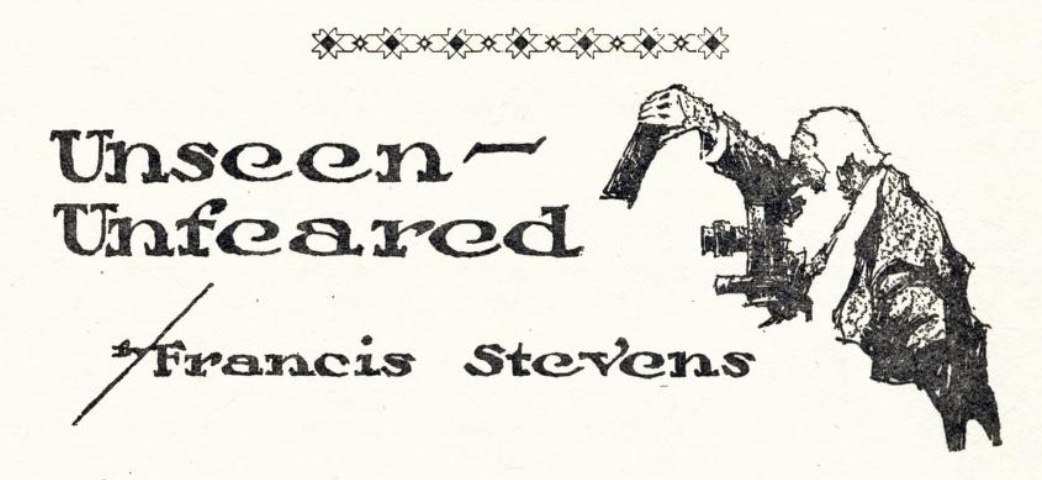UNSEEN — UNFEARED (10)
By:
September 8, 2023

“Unseen — Unfeared” was originally published in the February 10, 1919 edition of People’s Favorite Magazine. HiLoBooks is pleased to serialize it here for HILOBROW’s readers.
ALL INSTALLMENTS: 1 | 2 | 3 | 4 | 5 | 6 | 7 | 8 | 9 | 10.
“Don’t,” I said. “A walk in the fresh air will do me more good than fifty doctors.”
“Fresh air! There’s no fresh air on South Street in July,” complained Jenkins, but reluctantly yielded.
I had a reason for my preference. I wished to see people, to meet face to face even such stray prowlers as might be about at this hour, nearersunrise than midnight, and rejoice in the goodness and kindliness of the human countenance — particularly as found in the lower classes.
But even as we were leaving there occurred to me a curious inconsistency.
“Jenkins,” I said, “you claim that the reason Holt, when I first met him in the hall, appeared to twice close the door in my face, was because the door never opened until I myself unlatched it.”
“Yes,” confirmed Jenkins, but he frowned, foreseeing my next question.
“Then why, if it was from that picture that I built so solid, so convincing a vision of the man, did I see Holt in the hall before the door was open?”
“You confuse your memories,” retorted Jenkins rather shortly.
“Do I? Holt was dead at that hour, but — I tell you I saw Holt outside the door! And what was his reason for committing suicide?” Before my friend could reply I was across the room, fumbling in the dusk there at the electric lamp above the sink. I got the tin flap open and pulled out the sliding screen, which consisted of two sheets of glass with fabric between, dark on one side, yellow on the other. With it came the very thing I dreaded — a sheet of whitish, parchmentlike, slightly opalescent stuff.
Jenkins was beside me as I held it at arm’s length toward the windows. Through it the light of the arc lamp fell—divided into the most astonishingly brilliant rainbow hues. And instead of diminishing the light, it was perceptibly increased in the oddest way. Almost one thought that the sheet itself was luminous, and yet when held in shadow it gave off no light at all.
“Shall we—put it in the lamp again—and try it?” asked Jenkins slowly, and in his voice there was no hint of mockery. I looked him straight in the eyes. “No,” I said, “we won’t. I was drugged. Perhaps in that condition I received a merciless revelation of the discovery that caused Holt’s suicide, but I don’t believe it. Ghost or no ghost, I refuse to ever again believe in the depravity of the human race. If the air and the earth are teeming with invisible horrors, they are not of our making, and—the study of demonology is better let alone. Shall we burn this thing, or tear it up?”
“We have no right to do either,” returned Jenkins thoughtfully, “but you know, Blaisdell, there’s a little too darn much realism about some parts of your ‘dream.’ I haven’t been smoking any doped cigars, but when you held that up to the light, I’ll swear I saw—well, never mind. Burn it—send it back to the place it came from.”
“South America?” said I. “A hotter place than that. Burn it.”
So he struck a match and we did. It was gone in one great white flash.
A large place was given by morning papers to the suicide of Doctor Frederick Holt, caused, it was surmised, by mental derangement brought about by his unjust implication in the Peeler murder. It seemed an inadequate reason, since he had never been arrested, but no other was ever discovered.
Of course, our action in destroying that “membrane” was illegal and rather precipitate, but, though he won’t talk about it, I know that Jenkins agrees with me—doubt is sometimes better than certainty, and there are marvels better left unproved. Those, for instance, which concern the Powers of Evil.
RADIUM AGE PROTO-SF: “Radium Age” is Josh Glenn’s name for the nascent sf genre’s c. 1900–1935 era, a period which saw the discovery of radioactivity, i.e., the revelation that matter itself is constantly in movement — a fitting metaphor for the first decades of the 20th century, during which old scientific, religious, political, and social certainties were shattered. More info here.
SERIALIZED BY HILOBOOKS: James Parker’s Cocky the Fox | Annalee Newitz’s “The Great Oxygen Race” | Matthew Battles’s “Imago” | & many more original and reissued novels and stories.
